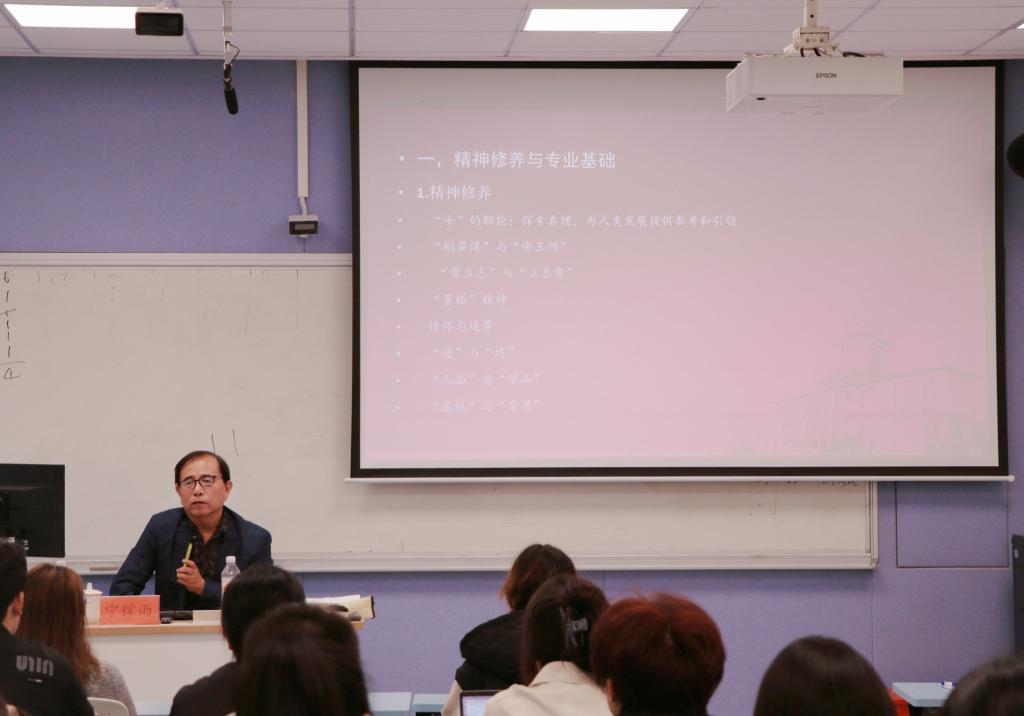Ning Jiayu, an elite professor and doctoral supervisor at Nankai University, gave an academic lecture titled “Paradigms, Methods, and New Challenges of Artificial Intelligence in Humanities and Social Sciences Research” at the invitation of the School of Humanities on the afternoon of March 28th. The lecture was chaired by Professor Luo Zhengming, Dean of the School of Humanities.
At the beginning of the lecture, Professor Ning Jiayu emphasized the importance of spiritual cultivation and professional foundation. He pointed out that the influence of “scholars” lies in exploring truth, providing philosophical references and guidance for human development, and contributing to the progress of human society. He mentioned the debate between “seeking livelihood” and “being an advisor to the emperor,” which reflects the dual pursuit of knowledge and morality. Professor Ning stressed the relationship between “constantly setting goals” and “constantly adhering to goals,” and mentioned the concept of “willingness to give up,” warning students to clarify what they most want to pursue in life and to “set firm goals.”
Regarding professional foundation, Professor Ning elaborated on the diversity of knowledge structures. He emphasized that improving the ability to collect and process literature, especially mastering reference books, paper-based literature, and digital literature, is an essential skill for researchers. In addition, the cultivation of logical thinking and critical thinking abilities is also extremely important for researchers in the humanities and social sciences. In research, researchers cannot fully follow academic norms, as overemphasizing academic norms can easily lead to the loss of one’s own academic ideas. Professor Ning further mentioned that innovation ability is the driving force behind the advancement of humanities and social sciences research. Researchers need to achieve both “innovation” and “knowledge of the past,” pushing forward what predecessors have done rather than simply repeating it.

Professor Ning gives a lecture
The second part of the lecture delved into the concept of research paradigms. Professor Ning pointed out that research paradigms have three core elements: ontology, epistemology, and methodology. He proposed that the value of “paradigm” as a unity in academic research lies in its unity, normativity, and repeatability, but it also faces issues of limitations and vulnerabilities. The concept of “paradigm” itself originates from the West, so the underlying question is whether it can be applied in China. Combining cases of ancient Chinese narrative literature, Professor Ning explored the research paradigms of stylistic history and the study of writers and their works, analyzed their contributions and limitations, and proposed developing a new paradigm of Chinese narrative cultural studies centered around story types to make up for the deficiencies of traditional research and gradually achieve “taking the Chinese as the foundation and the West as the application.”
In the discussion of research methods, Professor Ning compared ancient Chinese methods with Western ones, emphasizing the combination of textual research in ancient classical studies and the principles of modern Western philosophy. He pointed out that modern Chinese academic research should transcend the “either-or” mindset. Again, taking the study of Chinese narrative cultural studies as an example, he proposed the research method of “seeking truth from facts,” which means selecting suitable methodologies based on the research object, researcher, and research conditions, emphasizing the importance of considering both literature and history, as well as the coexistence of textual research and the principles of modern Western philosophy.
As for the new challenge of artificial intelligence, Professor Ning, based on his three-decade experience, introduced in detail the evolution of computer technology, from early desktop computers to today’s smartphones, and its applications in literature processing and digitization, which have greatly assisted his research. Despite the advantages of artificial intelligence in information integration, it also has limitations—the feeding of information and algorithmic judgments may affect the accuracy of conclusions. He emphasized that researchers must strictly verify and validate all information when utilizing artificial intelligence tools to ensure the effectiveness of their research outcomes.

Highlight of the lecture
Toward the end of the lecture, Professor Ning engaged in an interactive exchange with teachers and students present, creating a lively atmosphere.